Educating children on antimicrobial resistance in schools: a global initiative

Global efforts to combat antimicrobial resistance have largely been targeted at healthcare professionals, policymakers and the general public; children are often overlooked despite their potential role in fighting AMR and shaping future attitudes towards responsible antibiotic use and infection prevention. Educating children about AMR and proper antibiotic use can lead to long-term behaviour changes, as they influence their families and communities.
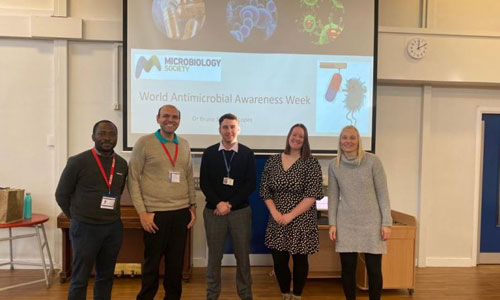
When we first discussed our plans for WAAW 2024, we envisioned an initiative that would transcend borders, bringing AMR education to students in different parts of the world. Our goal was simple yet impactful: to equip children with knowledge about AMR and hand hygiene, enabling them to become ambassadors of change within their homes and communities. Through these efforts, we successfully reached over 700 pupils.
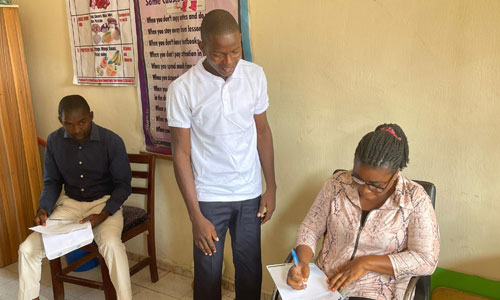
The first step was working together to plan the activities and securing approvals from schools to conduct these sessions. In Nigeria, three schools participated in the programme, while in the UK similar interactive sessions were held in five schools. We then proceeded in training nine volunteers from the Nigerian Association of Microbiology students at the University of Abuja, Nigeria.
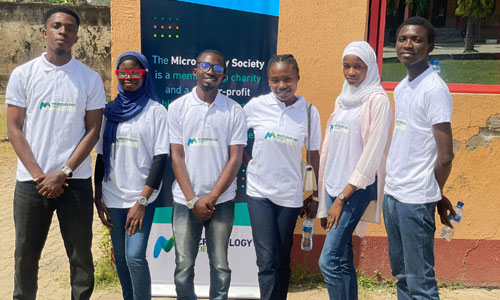
The volunteers supported Champions in conducting the outreach sessions across the schools in Nigeria. In the UK, Dr Bruno Silvester Lopes, supported by Dr Jones Gyamfi, held workshops in five different schools, reaching around 250 pupils. In both Nigeria and the UK, pupils were engaged in discussions on how AMR develops, the dangers of antibiotic misuse and the role of hygiene in preventing infections. These concepts were reinforced through two major interactive activities.
Hand hygiene experiment
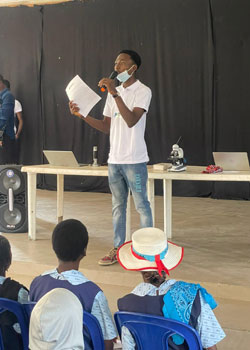
This activity was conducted using a fluorescent lotion, water, soap and hand sanitiser. To illustrate the spread of germs, we applied fluorescent powder to the hands of one student and had them shake hands with others. Under ultraviolet (UV) light, the powder, which represented the microbes, became visible, demonstrating how easily germs spread through touch. Students were then divided into three groups, each washing their hands using a different method: one group using water only, another using soap and water and the last using hand sanitiser.
After washing, we examined their hands under UV light to compare results. This visual approach highlighted that while hand sanitiser kills some germs, it does not remove dirt and washing with water alone does not clean the hands, whereas soap and water effectively cleans and eliminates microbes. The activity reinforced the importance of proper handwashing in preventing infections that contribute to AMR.
Biofilm formation demonstration
This activity was conducted using LEGO blocks (to demonstrate how bacteria form biofilms) and soft balls, representing antimicrobial treatments. Students built biofilm structures in teams, then attempted to dismantle them using the soft balls. Despite their efforts, they were unable to completely remove all of the ‘bacteria’, illustrating why biofilm-related infections and AMR related infections are difficult to eradicate and why proper hygiene and responsible antibiotic use are crucial.
To measure the impact of our outreach sessions, we administered pre- and post-tests to the students. The results from the UK showed a higher initial understanding of AMR concepts compared to students in Nigeria, highlighting the need for more targeted educational interventions in the country.
A key insight from these outreach sessions was that many students, and even some teachers, lacked awareness of the risks associated with self-medication and incomplete antibiotic courses.
In the UK, pupils and teachers were more aware of the risks of self-medication but, as in Nigeria, showed lot of enthusiasm for the subject. Pupils in the UK rated the event as four or five out of five. Prizes were distributed for pupils with the best hand hygiene and those who asked good questions; the prizes included giant microbe toys, fluffy bugs and bacterial comics, generously sponsored by Dr Jamie Hall. Teachers also received fluffy bugs, notepads, pens and bacterial comic books to share with their classes. Some teachers took notes on our session, to incorporate the content into their future lessons, while others emphasised its connection to topics the pupils had already studied.
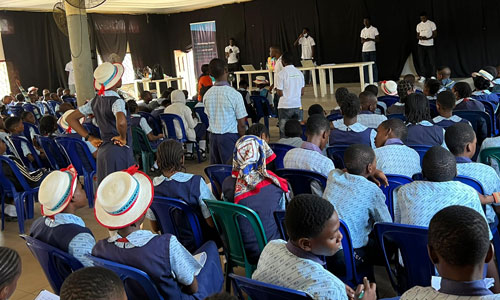
Overall, our activity was an impactful one, which was carefully planned; it received ethical approval for pre- and post-questionnaire information, allowing us to analyse the data to better understand the level of awareness pupils developed, and to bridge in any gaps. It also has the potential to inform policies related to education and create more awareness about microbiology, improving public health. By engaging with children early on, we helped instil a culture of responsible antibiotic use and effective infection prevention. However, the fight against AMR knows no borders, and we remain committed to contributing to global efforts in fighting AMR through the Knocking Out AMR project.
All of the blogs in this series are listed together via our WAAW 2024 blog listings and you can also find out more about the Society's AMR work via our Knocking Our AMR webpages.
